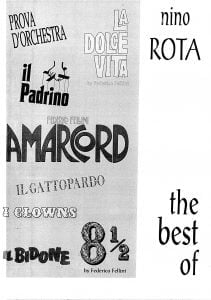The Godfather Waltz – Nino Rota (with sheet music)

Sheet Music download here.
Nino Rota
Giovanni Rota Rinaldi (3 December 1911 – 10 April 1979), better known as Nino Rota), was an Italian composer, pianist, conductor and academic who is best known for his film scores, notably for the films of Federico Fellini and Luchino Visconti.
He also composed the music for two of Franco Zeffirelli‘s Shakespeare films, and for the first two films of Francis Ford Coppola‘s Godfather trilogy, earning the Academy Award for Best Original Score for The Godfather Part II (1974).
During his long career, Rota was an extraordinarily prolific composer, especially of music for the cinema. He wrote more than 150 scores for Italian and international productions from the 1930s until his death in 1979 — an average of three scores each year over a 46-year period, and in his most productive period from the late 1940s to the mid-1950s he wrote as many as ten scores every year, and sometimes more, with a remarkable thirteen film scores to his credit in 1954.
Alongside this great body of film work, he composed ten operas, five ballets and dozens of other orchestral, choral and chamber works, the best known being his string concerto. He also composed the music for many theatre productions by Visconti, Zeffirelli and Eduardo De Filippo as well as maintaining a long teaching career at the Liceo Musicale in Bari, Italy, where he was the director for almost 30 years.
Film scores
Nino Rota wrote the score for the film The Glass Mountain in 1949. Notable was the singing of Tito Gobbi, one of the world’s greatest baritones. The film won a number of awards.
In his entry on Rota in the 1988 edition of The Concise Baker’s Biographical Dictionary of Composers and Musicians, music scholar Nicolas Slonimsky described him as “brilliant” and stated that his musical style:
… demonstrates a great facility and even felicity, with occasional daring excursions into dodecaphony. However his most durable compositions are related to his music for the cinema; he composed the sound tracks of a great number of films of the Italian director Federico Fellini covering the period from 1950 to 1979.
Furthermore, one of his compositional habits in particular came up for disapproving remarks: his penchant for pastiche of various past styles, which quite often turned into outright quotation of his own earlier music or even others’ music. One of the most noticed examples of such incorporation is his use of the Larghetto from Dvorák‘s Serenade for Strings in E major as a theme for a character in Fellini’s La Strada.
During the 1940s, Rota composed scores for more than 32 films, including Renato Castellani‘s Zaza (1944). His association with Fellini began with Lo sceicco bianco (The White Sheik) (1952), followed by I vitelloni (1953) and La strada (The Road) (1954). They continued to work together for decades, and Fellini recalled:
The most precious collaborator I have ever had, I say it straightaway and don’t even have to hesitate, was Nino Rota — between us, immediately, a complete, total, harmony … He had a geometric imagination, a musical approach worthy of celestial spheres. He thus had no need to see images from my movies. When I asked him about the melodies he had in mind to comment one sequence or another, I clearly realized he was not concerned with images at all. His world was inner, inside himself, and reality had no way to enter it.
The relationship between Fellini and Rota was so strong that even at Fellini’s funeral Giulietta Masina, Fellini’s wife, asked trumpeter Mauro Maur to play Rota’s Improvviso dell’Angelo in the Basilica di Santa Maria degli Angeli e dei Martiri in Rome.
Rota’s score for Fellini’s 8½ (1963) is often cited as one of the factors which makes the film cohesive. His score for Fellini’s Juliet of the Spirits (1965) included a collaboration with Eugene Walter on the song, “Go Milk the Moon” (cut from the final version of the film), and they teamed again for the song “What Is a Youth?“, part of Rota’s score for Franco Zeffirelli‘s Romeo and Juliet.
The American Film Institute ranked Rota’s score for The Godfather #5 on their list of the greatest film scores. After being nominated for an Academy Award for this score, the nomination was later revoked when it was discovered that Rota recycled a theme from a previous score, one he wrote two decades prior for the film Fortunella and thus no longer considered original despite being played differently.
The nomination was then given to the film Sleuth , while Charlie Chaplin and two co-authors for their score featured in Limelight, a 21-year-old film that had just become eligible because it had not been screened in Los Angeles until 1972, went on to win the award. He went on to win an Oscar for his score for The Godfather Part II. His score for War and Peace was also nominated for the list. In all, Rota wrote scores to more than 150 films.
